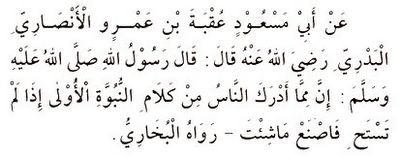Hadith #20 --------- (PartII)
continued from part I
lessons
There are two aspects of haya' : Natural haya' and acquired haya'. The later is attained as a result of knowing and realizing the Glory of Allah and His attributes.
* * *
There are many manifestations of haya' as mentioned by Ustaz Jamaludin Zarabozo in his commentaries on the Forty Hadith:
- Having haya' towards Allah - a Muslim should feel ashamed to have Allah see him doing - or hear him saying - something that displeases Allah, especially when that Muslim is alone and out of the view of humankind.
- Haya' towards the angels - as they are noble and dignified creatures who witness the acts performed by humans.
- Haya' towards other humans - an essential characteristic that keeps people from harming one another and from performing indecent acts.
- Haya' towards the person him/herself - a person should be ashamed of him/herself when he/she performs acts that are shameful. If he/she notices that his/her haya' level is low he/she should improve it by remembrance of Allah, getting closer to Him, and fearing Him.
* * *
This great concept of haya' or modesty should be promoted through all possible means and at all levels and by everyone: educators, teachers, lecturers, parents, and du'at (preachers). It is unfortunate that today, and because of technology misuse, this great concept is threatened. Hence there is greater responsibility for the Muslim du'at, parents, educators, etc. to shoulder. The evildoers are promoting anything that distorts and corrupts haya'. Those people are taking advantage of the system where technology advancement is double sided. It is positive and beneficial on one hand, but it can be negative and destructive on the other. Muslims should learn, master and use Information Technology (IT) positively to promote what is good and beneficial. By mastering IT they should make deliberate efforts to be in control of it and minimize its negative destructive side such as by designing and producing filtering softwares.
The same thing can be said about the media, where it is entertainment oriented. Entertainment is taking new destructive directions which negatively affect the concept of haya' a great deal. If haya' is distorted, iman (faith) can be distorted too. The chances of committing sins and evil will be higher, and the chances of delaying or neglecting obligations will be higher as well. Even chances of committing crimes will be higher due to these new directions of entertainment, where crime, drug addiction, distrustful acts, and adultery are all looked at as means of entertainment. Semi naked bodies, songs that promote evil, etc. are aspects of new entertainment. Unfortunately, we Muslims borrow media material from the West without any kind of evaluation, filtering or classification. More instructions and guidelines are needed from media organisers regarding the nature of movies and TV. There should be programs for families' awareness.
* * *
Haya' can sometimes be abused as a justification for not doing something or giving up an obligatory act. For example, being silent or passive in the presence of falsehood or oppression for no reason except claiming haya'. Or using haya' as an excuse for not encouraging good or discouraging evil. Unless, for both of teh above mentioned cases, there is another good reason for not doing these acts such as considering the most likely expected harmful consequences.
Another example of abusing haya' is to use it as an excuse for not seeking knowledge. In many Muslim cultures this matter is confused and misunderstood where there is a proverb or cliché that says: "There is no modesty in asking questions in religious matters". But this cliché is only practiced in a few certain sensitive issues. However when it comes to seeking knowledge in a classroom, the situation is different. Most Muslims become shy and use modesty as an excuse. Parents at home, teachers at school, even lecturers at Universities add to the problem where they may treat asking questions as a sign of not being modest. This attitude needs to be changed to the right, positive one.
Another example is using haya' as an excuse for not doing what is correct and allowed. You know that something should be done and it is good and allowed or is even a recommended or obligatory act. However, you simply give up and do not do it because of a claimed haya'. Not giving sadaqah (charity) to a needy in front of others, not taking away a harmful material from the street or the path of the Muslims, or not helping or giving a hand to a disabled or an elderly person to cross the street are some good examples of this phenomenon.
conclusion
Haya' or modesty is a great Islamic concept that leads to goodness and keeps a Muslim away from doing a bad or indecent act when its level is maximized. Treating bad actions, as shown by revelation, as evil acts and feeling ashamed of Allah to do it and ashamed of the community, are ways of acquiring haya'. Iman and haya' are linked. When there is iman, there is haya', and vice versa. All of us are borne with natural haya'. However it is subject to be spoiled due to environment and dominating ideologies. Technology misuse has its negative and destructive impact on haya'. Muslims need to be aware of such challenges and exert their effort to overcome them. Haya' cannot be used as an excuse for not doing good deeds and acts.
--------------------------------------------------------------------------
may allah grant us the strength and emaan to practice what he ordered us to do. first to my very own self

